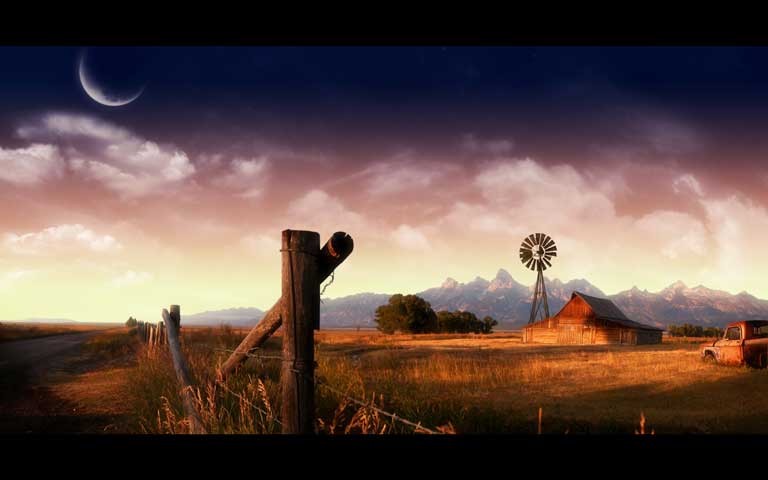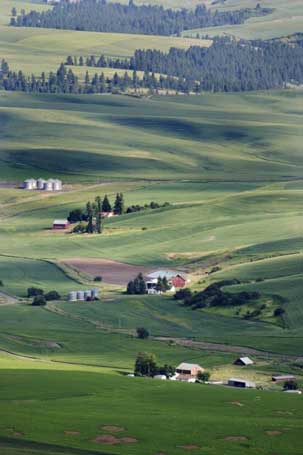The Blogging Farmer
Alex Tiller’s Blog on Agriculture and Farming
'They Ain't Makin' It No More...'
The land rush is on for productive farmland, but buyers beware…
Smart people have figured out that making money means putting your money to work--and one of the best ways to do that is buying productive farmland. The land rush is on--and right now, as commodities explode in price, those smart folks who not only want to survive, but thrive and remain at the top of the heap are snapping up plots in America's heartland right and left. For example, while residential and commercial real estate prices are falling across the country, a plot of farmland near Ames, Iowa that was appraised in November 2010 at around $5700 an acre went for $8200 an acre in a recent auction. That a gain of approximately 30%!
What's also happening is that farmers are holding on to their land, since (as realtors will tell you), "they ain't makin' it anymore." Farm income is up for a change...and maybe that's just karma. Consider that before last Great Depression, during the boom times of the Jazz Age, people on the farms weren't sharing in that prosperity...in fact, the depression in farm country started a long time before the crash of 1929, and it did it sure didn't get much better after 1930.
And therein lies a warning...
As terrific as this all seems, there is always a chance of a sudden dive in the market. One of the reasons that farm families suffered so much during the 1920s while Wall Street had a party had to do with the fact that before 1920, prices on a lot of crops were very high--mainly because of the First World War. We were exporting a lot of food to the Allies before 1917 (since most young European men were fighting instead of farming), and once the Yanks got into the scrap, the U.S. Army became a big customer. In response, farmers, whose products had never been in such demand, bought more land and invested in new, mechanical equipment, anticipating that the boom would never end.
Of course, this was all bought on credit...then suddenly, the war ended--and so did the good times.
Although it seems likely that food commodities will continue to rise in price, even the wisest among us cannot see all ends. One thing that's different is that more of these investors are paying less with credit and more with cash. That leaves them less vulnerable. Nonetheless, a sudden nose-drive in the commodities market could change things very quickly.
The other factor in the equation is volatile energy prices. It takes fossil fuels to run a farm, and as things stand, most of those have to be imported from parts of the world that aren't particularly friendly to the USA. Again, anything could happen...
It's worth pointing out that the fellow who bought that plot of land in Iowa for 30% above its appraised value was getting back a bit of his own. According to the story in Bloomberg News, that land had been in his family originally, back around 1900--it was a family legacy that enabled him to get it back.
Published February 25, 2011 at Alex Tiller’s Blog on Agriculture and Farming
***
The New Call For Frugality--And What It Means To Farmers
Deficit reduction and the average American farmer
It would have been nice if government had been as concerned about debts and deficits five, ten, twenty years ago as they are now--but with a new Congress apparently getting at least a little bit serious about deficit reduction it's time to consider just what this all means for the average family farmer.
The Farm Bill in the U.S. is what's called an "omnibus bill" that comes up for consideration every five years. By "omnibus," it means that it's a piece of legislation that covers a lot of different issues. The Farm Bill, which largely determines agricultural and food policy in this country, deals with community food programs, commodities, trade, farm credit, conservation, research, food safety, general welfare of rural communities, environmental issue, subsidies and more.
It's hardly news by now that President Obama is planning a five-year freeze on "discretionary spending"--which means virtually everything except defense and the military. One thing that farmers are going to see is a dramatic drop in direct payments. Those who participate in the Average Crop Revenue Election (ACRE) Program are going to see those payments drop by as much as 20%. Now, arguably, these payments, meant to function as a safety net when farms experience a bad year, are paid out every year, whether it was good or bad. The argument here is whether or not such payments should be made if they are not necessary, i.e., Farmer Brown had a bumper crop that year and actually made a profit. We could see ACRE being reconfigured to match payments to farmers who actually are having trouble, and not just being a generic farm welfare program, and on balance that would be good for farmers.
Another potentially positive side to the current Farm Bill--an end to a multi-billion dollar giveaway to a small group of wealthy sugar producers. The sugar subsidy was originally part of the 1981 Farm Act, and provides subsidies and price supports to domestic sugar producers. At the time this seemed like a good idea, but in the subsequent years we've seen that it creates major hardship for growers in unsubsidized, and usually extremely poor, countries in the Caribbean. American farmers are simply the best in the world; in a fair competition we can grow whatever crops we need to grow. Subsidies make some sense for newborn industries or where our overseas competitors are subsidizing their farmers, but neither of those are the case for sugar production and hopefully this obsolete giveaway can be ended and the funds redirected towards programs that actually strengthen American agriculture.
There is no doubt that family farmers are going to feel some pain here, but the issues are far from simple. I'll be keeping an eye on them as they develop.
Published February 07, 2011, at Alex Tiller’s Blog on Agriculture and Farming.
Hello, and thanks for checking out my blog. My name is Alex Tiller and I grew up in rural Ohio (Clark County) where my family still owns farmland (corn and beans). I am a member of the American Society of Farm Managers and Rural Appraisers and am also an agribusiness author/blogger. I write about commercial farming, family farms, organic food production, sustainable agriculture, the local food movement, alternative renewable energy, hydroponics, agribusiness, farm entrepreneurship, and farm economics and farm policy. I visit lots of farms in different areas of the country (sometimes the world) that grow all kinds of different crops and share what I learn with you through this blog. You can contact me via email by clicking here: Email Alex at http://blog.alextiller.com/contact
Founder/Publisher/Editor: David McGee
Contributing Editors: Billy Altman, Laura Fissinger, Christopher Hill, Derk Richardson
Logo Design: John Mendelsohn (www.johnmendelsohn.com)
Website Design: Kieran McGee (www.kieranmcgee.com)
Staff Photographers: Audrey Harrod (Louisville, KY; www.flickr.com/audreyharrod), Alicia Zappier (New York)
E-mail: thebluegrassspecial@gmail.com
Mailing Address: David McGee, 201 W. 85 St.—5B, New York, NY 10024





